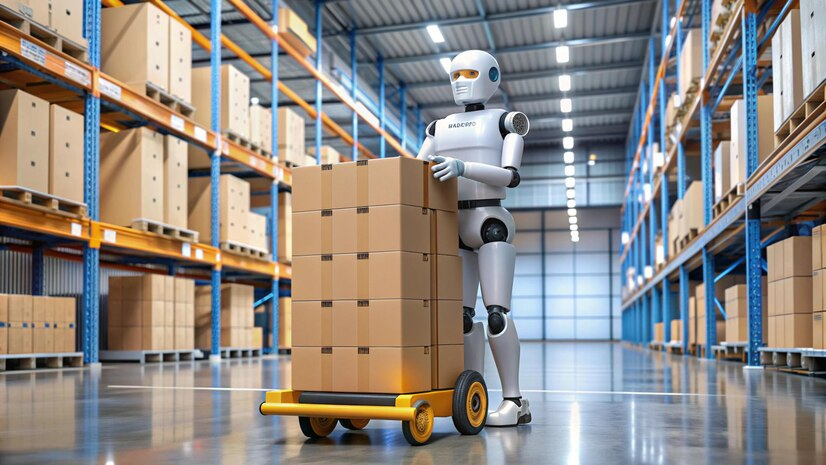AI in Logistics – Redefining Supply Chain Management for the Future

Strong 8k brings an ultra-HD IPTV experience to your living room and your pocket.
Logistics and transportation businesses face new challenges every day, like rising costs, unexpected disruptions, and the need for faster deliveries. Traditional methods aren’t enough to keep up with these demands.
This is where Artificial Intelligence (AI) plays a pivotal role in transforming logistics operations. AI isn’t just another technological trend; it’s a practical and powerful solution for overcoming the most pressing problems in logistics. By enabling smarter decision-making, automating routine processes, and improving efficiency, AI helps businesses save time, cut costs, and enhance customer satisfaction.
AI is helping logistics companies stay competitive by predicting demand, optimizing delivery routes, and improving warehouse operations. This article explains how AI is changing the logistics industry and why using AI-driven solutions is essential for success in the future.
How AI is Revolutionizing the Logistics Industry?
1. Better Forecasting and Demand Planning
AI can analyze huge amounts of data to forecast demand accurately. Logistics companies no longer have to rely solely on past trends—they can now predict future needs with precision. This helps prevent overstocking or understocking, saving money and ensuring customers get what they need on time.
For instance, AI tools can analyze seasonal trends, market behavior, and even unexpected events like weather disruptions. This ensures supply chains remain efficient, even during volatile times.
2. Smarter Warehouses
AI is revolutionizing warehouse operations. Smart systems powered by AI can:
- Automate tasks like sorting, picking, and packing.
- Optimize storage layouts for faster retrieval.
- Track inventory in real-time to prevent shortages or overstocking.
For example, companies like Amazon use AI-driven robots in their warehouses, enabling faster order fulfillment and reducing manual labor costs.
3. Faster and Cost-Effective Deliveries
Transportation is one of the biggest expenses in logistics. AI helps reduce these costs by finding the most efficient delivery routes using real-time data on traffic, weather, and road conditions.
AI is also advancing autonomous delivery vehicles and drones, which will further lower costs and speed up deliveries in the future.
4. Real-Time Visibility Across the Supply Chain
AI offers a clear view of the entire supply chain. By combining AI with IoT sensors, businesses can track shipments in real-time, monitor product conditions (like temperature for perishable goods), and receive immediate alerts about delays or problems.
This transparency helps companies respond quickly, minimize disruptions, and keep customers informed.
5. Enhanced Customer Experience
AI improves how logistics companies interact with their customers. AI-powered chatbots are available 24/7, giving fast answers to questions like “Where is my package?”. These systems also automatically send updates, keeping customers informed about delays and offering alternative delivery solutions when necessary.
Personalizing the customer experience helps build stronger relationships, leading to better customer loyalty and trust.
6. Supporting Sustainability
AI helps logistics companies reduce their environmental impact. By optimizing delivery routes and loads, AI lowers fuel use and emissions. It also promotes sustainable practices, such as energy-efficient warehouses and reducing waste.
Benefits of Integrating AI in Logistics
Adopting AI in logistics brings multiple benefits, making operations faster, smarter, and more cost-effective:
- Improved Efficiency: AI can automate routine tasks such as inventory management and route planning, reducing human error and speeding up operations. This means fewer delays and quicker deliveries.
- Cost Savings: By optimizing delivery routes and warehouse operations, AI helps reduce fuel costs and labor expenses.
- Better Decision Making: AI uses data to predict issues like delays or supply shortages, helping companies make smarter decisions.
- Enhanced Customer Experience: AI enables real-time tracking, faster response times, and better communication with customers. This leads to greater satisfaction and loyalty.
AI in Logistics: Use Cases
AI is already being used in many practical ways across logistics. Here are a few examples:
- Predictive Maintenance: AI helps monitor the condition of vehicles and equipment in real-time. By predicting when maintenance is needed, it can prevent breakdowns, saving time and money on repairs.
- Route Optimization: AI analyzes traffic patterns, weather conditions, and other factors to determine the most efficient delivery routes. By optimizing routes, AI also helps reduce fuel costs, ensuring deliveries are on time and more efficient.
- Smart Warehouses: AI-powered robots and automation tools are used to handle tasks like picking, sorting, and packaging products. This makes warehouses more efficient and reduces human error.
- Inventory Management: AI tools can track stock levels and automatically reorder products when they run low, ensuring that warehouses are always stocked without overordering.
- Customer Service: AI chatbots can handle customer inquiries 24/7, providing instant responses about shipment status, delays, and delivery updates. As a result, customer support becomes quicker and more reliable, improving overall satisfaction.
Logistics App Development: The Gateway to AI
To unlock the full potential of AI, businesses need robust solutions—and logistics app development plays a key role. Custom logistics apps integrate AI features like real-time tracking, demand forecasting, and route optimization, all in one platform.
These apps simplify supply chain management, increase efficiency, and help businesses stay competitive in a fast-paced industry.
Future of AI in Logistics: Key Trends to Look For
As AI technology continues to evolve, here are some key trends that will shape the future of logistics:
- Increased Use of Autonomous Vehicles: Self-driving trucks and drones will become more common, reducing the need for human drivers and speeding up delivery times.
- AI-Powered Supply Chain Visibility: AI will provide deeper visibility into every stage of the supply chain, allowing businesses to track products in real-time, predict potential disruptions, and optimize processes instantly.
- Personalized Customer Experiences: AI will help logistics companies offer more personalized services, such as flexible delivery options and customized shipment tracking, based on customer preferences.
- Sustainability through AI: As sustainability becomes more important, AI will be used to optimize routes, reduce fuel consumption, and create more eco-friendly logistics operations.
Conclusion
AI is not just a future concept in logistics—it’s already here. AI is transforming supply chain management, from warehouses to delivery trucks. It’s making logistics smarter, faster, and more customer-friendly.
If your business wants to stay ahead, investing in AI-driven solutions isn’t optional—it’s essential. The future of logistics is here. Are you ready to embrace it?
Note: IndiBlogHub features both user-submitted and editorial content. We do not verify third-party contributions. Read our Disclaimer and Privacy Policyfor details.



